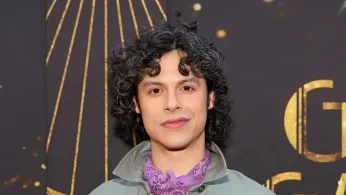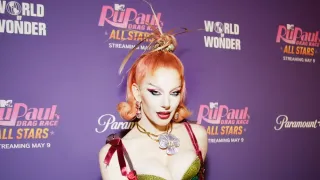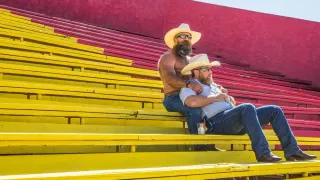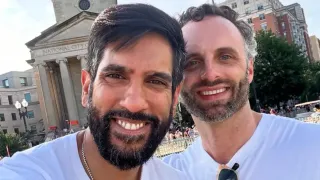
5 hours ago
Jonny Beauchamp Opens Up About Small-Town Queer Representation in New Indie Pilot 'The Misadventures of Bucky Beene'
READ TIME: 16 MIN.
Actor Jonny Beauchamp is bringing queer stories to unexpected places. In a recent conversation about his role in the indie television pilot "The Misadventures of Bucky Beene," Beauchamp emphasized the project's mission to showcase LGBTQ+ life beyond the familiar narratives of urban gay enclaves. The actor's commitment to representing small-town queer experiences reflects a growing movement in entertainment to diversify where and how LGBTQ+ stories are told.
Beauchamp's enthusiasm for "The Misadventures of Bucky Beene" stems from its setting and perspective. The actor expressed hope that his role in the pilot will serve as a reminder that LGBTQ+ individuals exist everywhere, not exclusively in major metropolitan areas. This emphasis on geographic diversity in queer storytelling addresses a persistent gap in mainstream media representation, where LGBTQ+ narratives have historically centered on cities like New York, San Francisco, and Los Angeles.
The focus on small-town queer life carries particular significance in contemporary American culture, where rural LGBTQ+ individuals often face unique challenges including limited access to community resources, healthcare, and social support networks. By choosing to tell stories set outside urban centers,"The Misadventures of Bucky Beene" joins a growing body of work that recognizes the diversity of queer experiences across different geographic and socioeconomic contexts.
Beauchamp's dedication to meaningful LGBTQ+ representation is not new. The New York native gained significant attention for his role in Roland Emmerich's 2015 film"Stonewall," where he portrayed Ray Castro, a charismatic homeless youth who serves as a guide to queer city life. For that role, Beauchamp drew inspiration from legendary queer activist Sylvia Rivera, infusing his character with the spirit and resilience of one of the Stonewall Riots' most important figures.
The actor's background uniquely positions him to bring authenticity to his roles. With a theater degree and a minor in gender and sexuality studies, Beauchamp has approached his craft with both artistic skill and academic understanding of LGBTQ+ issues. This combination of training and passion has informed his career choices, leading him to projects that prioritize authentic queer narratives over mainstream appeal.
In his Queerty interview, Beauchamp also discussed working with performer Peppermint on the indie pilot, describing the experience as magical. Peppermint, a transgender actress, singer, and reality television personality who gained widespread recognition through "RuPaul's Drag Race," brings her own considerable talents and perspective to the project. The collaboration between Beauchamp and Peppermint represents a meeting of artists committed to expanding the scope and depth of queer representation in entertainment.
Beauchamp's path to professional acting reflects the precarious nature of pursuing an artistic career. His journey began unexpectedly in fifth grade when, against his mother's wishes, he forged her signature to audition for a school production of"Annie" at Viola Elementary School. Landing the role of Rooster, Beauchamp's mother discovered his theatrical pursuits only when the school called about costume help. Rather than punishing him, she recognized his passion and allowed him to continue pursuing theater.
Despite his early passion and formal training, Beauchamp faced significant struggles establishing himself professionally. At 25, while working in a restaurant and unable to make ends meet, he seriously considered abandoning acting for a position with Delta Airlines. Instead, he made a crucial decision: to give himself one year of complete commitment to his craft, dedicating every day to artistic development regardless of financial hardship.
During this pivotal year, Beauchamp lived without heat in an apartment where he refused to pay rent while fighting with landlords and courts. His daily routine consisted of watching and analyzing films, attending plays and performances, taking classes, and coaching other actors for auditions—all sustained by little more than coffee and cigarettes. This period of intense dedication and financial instability ultimately laid the groundwork for his breakthrough roles.
"The Misadventures of Bucky Beene" represents the kind of independent LGBTQ+ project that often serves as a proving ground for innovative storytelling. Indie productions frequently provide opportunities to explore narratives that mainstream studios might consider too niche or commercially risky. For queer creators and actors, these projects offer crucial platforms to develop authentic stories without the pressure to conform to heteronormative expectations or sanitize LGBTQ+ experiences for broader audiences.
The pilot's focus on small-town queer life addresses a critical need in LGBTQ+ media representation. While urban queer narratives have become increasingly common in mainstream entertainment, stories about rural and small-town LGBTQ+ individuals remain comparatively rare. This geographic imbalance in representation can reinforce harmful stereotypes suggesting that queer people only belong in or should migrate to cities, effectively erasing the experiences of LGBTQ+ individuals who live, work, and build communities in smaller towns across America.
As "The Misadventures of Bucky Beene" moves forward as a pilot, its potential impact extends beyond entertainment value. Projects like this contribute to a broader cultural shift in how LGBTQ+ stories are told and who gets to tell them. By centering small-town queer experiences and featuring performers like Beauchamp and Peppermint who bring both talent and authentic perspectives to their roles, the pilot exemplifies the kind of representation that can reshape public understanding of LGBTQ+ diversity.
Beauchamp's career trajectory—from forging his mother's signature for a school play to starring in films about pivotal moments in LGBTQ+ history to championing small-town queer narratives—illustrates the power of persistence and authentic storytelling. His commitment to roles that honor queer experiences, informed by both his academic background in gender and sexuality studies and his lived experiences as a queer artist, positions him as an important voice in contemporary LGBTQ+ entertainment.






